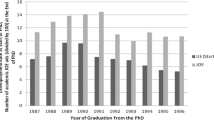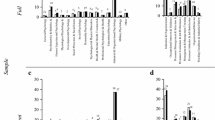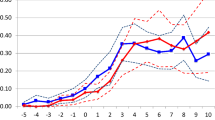Abstract
The “productivity puzzle,” or gender gap in research productivity, is often thought to be due, in part, to gendered child care responsibilities. The time, energy, and money devoted to child-rearing can reduce the research productivity of scholars, especially women. However, there is little systematic research on this issue. The present study contributes to the literature by exploring the productivity puzzle in light of the influence of eight age sets of children. Data are from the National Research Council's 1995 Survey of Doctoral Recipients. They refer to 11,231 PhDs, in the sciences and engineering, who are employed in academia. Controlling for children, structural factors and personal characteristics of the PhDs, the present study finds that women still publish significantly less than men. Second, productivity is higher for PhDs with children less than 11. Third, productivity is relatively low for women with young children. Fourth, for the social sciences, the area with the highest proportion of women PhDs, gender is unrelated to productivity, but women in the social sciences who have young children have relatively low productivity. The leading predictors of productivity included location in a research university and effort (hours worked). The full model explains 39% of the variance in productivity. Children are not a strong predictor of productivity, but the influence that they do have followed a gendered pattern.
Similar content being viewed by others
REFERENCES
Allison, P. D., and Scott Long, J. S. (1990). Departmental effects on scientific productivity. American Sociological Review. 55 (August): 469–478.
Allison, P. D., and Stewart, J. A. (1974). Productivity differences among scientists: Evidence for accumulative advantage. American Sociological Review. 39 (August): 596–606.
Astin, H. S. (1969). The Woman Doctorate in America, Russell Sage, New York.
Becker, G. (1991). A Treatise on the Family, Harvard University Press, Cambridge, MA.
Bianchi, S., Milkie, M., Sayer, L., and Robinson, J. (2000). Is anyone doing the housework:Trends in the gender division of housework. Social Forces 79 (September): 191–228.
Bittman, M., and Wajcman, J. (2000). The rush hour:The character of leisure time and gender equity. Social Forces 79 (September): 165–189.
Blackburn, R., and Lawrence, J. (1995). Faculty at Work:Motivation, Expectation, Satisfaction. Johns Hopkins University Press, Baltimore.
Brown, P. (1997). Methodological Report of the 1995 Survey of Doctorate Recipients. Office of Scientific and Engineering Personnel, National Research Council: Washington.
Bryson, R., Bryson, J. B., and Johnson, M. (1978). Family size, satisfaction, and productivity in dual career couples. Psychology of Women Q. 3(1): 67–77.
Budig, M. J., and England, P. (2001). The wage penalty for motherhood. American Sociological Review. 66 (April): 204–225.
Cole, S. (1979). Fair Science: Women in the Scientific Community, Free Press, New York.
Cole, S., and Singer, B. (1991). A theory of limited differences. In: Zuckerman, H., Cole, J, and Bruer, J.T. (eds.), The Outer Circle:Women in the Scientific Community, Norton, New York, pp. 277–310.
Cole, S., and Zuckerman, H. (1984). The productivity puzzle:Persistence and change in patterns of publication of men and women scientists. Advances in Motivation and Achievement 2: 217–258.
Cole, S., and Zuckerman, H. (1987). Marriage, motherhood, and research performance in science. Scientific American 256(2): 119–125.
Cole, S., and Zuckerman, H. (1991). Marriage, motherhood, and research performance in science. In: Zuckerman, H., Cole, J., and Bruer, J. T. (eds.), The Outer Circle:-Women in the Scientific Community, Norton, New York, pp. 157–169
Epstein, C. (1974). Reconciliation of womens' roles. In: Coser, R. (ed.), The Family: Its Structure and Function, St. Martins, New York, pp. 473–489.
Ferber, M., and Huber, J. (1979). Husbands, wives, and careers. Journal of Marriage and the Family. 41 (May): 315–325.
Fox, M. F. (1983). Publication productivity among scientists: A critical review. Social Studies of Science. 13(2): 285–305.
Fox, M. F. (1991). Gender, environmental milieu and productivity in science. In: Harriet Zuckerman, H., Cole, J., and Bruer, J. T. (eds.), The Outer Circle: Women in the Scientific Community, Norton, New York, pp. 189–204.
Fox, M. F. (1995). Women and scientific careers. In: Jasinoff, S. (ed.), Handbook of Science and Technology Studies, Sage Publications, Thousand Oaks, CA, pp. 205–223.
Fox, M. F. (1999). Gender, hierarchy, and science. In: Chafetz, J. (ed.), Handbook of the Sociology of Gender, Kluwer, New York, pp. 441–457.
Fox, M.F., and Faver, C. (1985). Men, women, and publication productivity among social work academics. Sociological Q. 26(4): 537–549.
Hamovitch, W., and Morganstern, R. (1977). Children and the productivity of academic women. Journal of Higher Education 48(6): 633–645.
Hargens, L., McCann, J. C., and Reskin, B. F. (1978). Productivity and reproductivity: Fertility and professional achievement among research scientists. Social Forces 57 (September): 154–163.
Helmreich, R. L., Spence, J. T., Beane, W. E., Lucker, G. W., and Matthews, K. (1980). Making it in academic psychology: Demographic and personality correlates of attainment. Journal of Personality and Social Psychology 39(5): 896–908.
Hertz, R. (1986). More Equal than Others: Women and Men in Dual Career Marriages, University of California Press, Berkeley.
Hochschild, A. R. (1997). The Time Bind: When Work Becomes Home and Home Becomes Work, Henry Holt, New York.
Keith, B., Layne, J. S., Babchuk, N., and Johnson, K. (2002). The context of scientific achievement:sex, status, organizational environments, and the timing of publication on scholarship outcomes. Social Forces 80 (June): 1253–1282.
Kyvik, S. (1990). Motherhood and scientific productivity. Social Studies of Science 20 (1): 149–160.
Levin, S., and Stephan, P. (1998). Gender differences in the rewards to publishing in academe: science in the 1970's. Sex Roles 38(11/12): 1049–1064.
Long, J. S. (1990). The origins of sex differences in science. Social Forces 68 (June): 1297–1315.
Long, J. S. (1992). Measures of sex differences in scientific productivity. Social Forces 71 (September): 159–178.
Long, J. S., Allison, P., and McGinnis, R. (1993). Rank advancement in academic careers:Sex differences and productivity. American Sociological Review 58 (October): 703–722.
Long, S., and Fox, M. F. (1995). Scientific careers: Universalism and particularism. Annual Review of Sociology 21: 45–71.
Lotka, A. J. (1926). The frequency distribution of scientific productivity. Journal of the Washington Academy of Sciences 16: 317.
National Science Board (2000). Science and Engineering Indicators (Vol. 2), National Science Foundation, Washington, DC.
Neter, J., Kutner, M. H., Nachsheim, C., and Wasserman, W. (1996). Applied Linear Statistical Models, McGraw-Hill, New York.
Reskin, B. (1978). Scientific productivity, sex, and location in the institution of science. American Journal of Sociology 83(5): 1235–1243.
Spenner, K., and Rosenfeld, R. (1990). Women, work, and identities. Social Science Research 19(3): 266–299.
Stack, S. (1994a). The effects of gender on publishing: The case of sociology. Sociological Focus 27(1): 81–83.
Stack, S. (1994b). The class of 1976: Publication and type of location. Sociological Spectrum 14(2): 293–298.
Stack, S. (1994c). An analysis of the impacts of books and journal articles. International Review of Modern Sociology 24 (Autumn): 119–125.
Stack, S. (2001). The effect of field of terminal degree on scholarly productivity:An analysis of criminal justice faculty. Journal of Criminal Justice Education 12 (Spring): 19–34.
Stack, S. (2002a). Gender and scholarly productivity: 1970–2000. Sociological Focus 35 (August): 285–296.
Stack, S. (2002b). Gender and scholarly productivity: The case of criminal justice. Journal of Criminal Justice 30(2): 175–182.
Suitor, J. J., Mecom, D., and Feld, L. (2001). Gender, household labor, and scholarly productivity among university professors. Gender Issues 19(4): 50–67.
Sweet, L., and Bumpass, L. (1993). A National Survey of Families and Households. Center for Demography and Ecology, University of Wisconsin, Madison.
Ward, K. B., Gast, J., and Grant, L. (1992). Visibility and dissemination of women's and men's sociological scholarship. Social Problems 39 (August): 291–298.
Ward, K., and Grant, L. (1995). Gender and academic publishing. In: Smart, J. (ed.), Higher Education: Handbook of Theory and Research (Vol. XI), Agathon Press, New York, pp. 172–212.
Xie, Y., and Shauman, K. (1998). Sex differences in research productivity. American Sociological Review 63 (December): 847–870.
Xie, Y., and Shauman, K. (2003). Women in Science. Harvard University Press, Cambridge.
Zhang, C.-X., and Farley, J. (1995). Gender and the distribution of household work. Journal of Comparative Family Studies 26(2): 195–205.
Zuckerman, H. (1988). The sociology of science. In: Smelser, N. (ed.), Handbook of Sociology, Sage Publications, Newbury Park, CA, pp. 511–574.
Zuckerman, H. (1991). The careers of men and women scientists: A review of current research. In: Zuckerman, H., Cole, J., and Bruer, J. T. (eds.), The Outer Circle:-Women in the Scientific Community, Norton, New York, pp. 27–56.
Author information
Authors and Affiliations
Rights and permissions
About this article
Cite this article
Stack, S. Gender, Children and Research Productivity. Research in Higher Education 45, 891–920 (2004). https://doi.org/10.1007/s11162-004-5953-z
Issue Date:
DOI: https://doi.org/10.1007/s11162-004-5953-z




